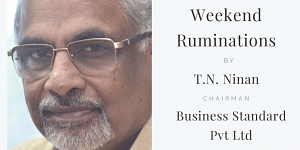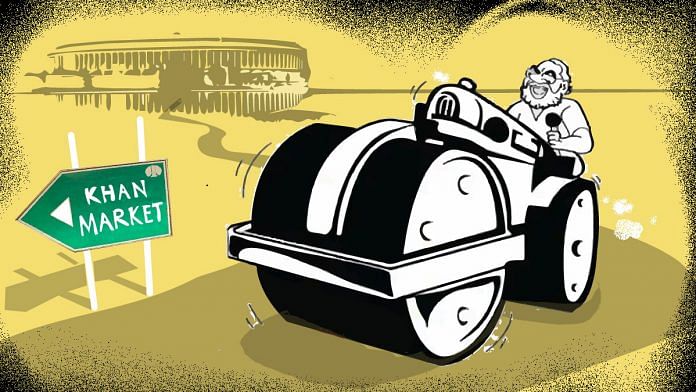The elections are over, and it is time to assess the interpretations of the outcome. The message from the voter is said to be anti-elitist; an expression of hope by the aspiring; endorsement by beneficiaries of the Modi government’s programmes; and a victory of the culturally-rooted over the deracinated. It may be all that and more, but in the story-line of seminal change, it is instructive to see whom the victors are targeting — and whom they are not.
We have left behind the Left vs Right debate. The Left has been decimated, and there is no serious market-orientation to take its place. Rather, those presiding over an under-performing, unequal system intend to mollify losers with more welfarism. When the newly elected Lok Sabha members’ median wealth is about Rs 5 crore, and average wealth Rs 20.9 crore, the majority of those elected belong to the wealthiest 0.1 per cent of the adult population. From these plutocrats’ perspective, welfarism, combined with mobilisation around religion, encourages palliatives, not structural change.
 What about feudalism and dynasties: naamdaars vs kaamdaars? The rhetoric struck home because of the Narendra Modi vs Rahul Gandhi binary. But we also have Varun Gandhi, Harsimrat Kaur (assets declared: Rs 40 crore), Dushyant Singh (address: City Palace, Dholpur), Rajkumari Diya Kumari (address: City Palace, Jaipur) and sundry others who have all been elected as members of the ruling alliance.
What about feudalism and dynasties: naamdaars vs kaamdaars? The rhetoric struck home because of the Narendra Modi vs Rahul Gandhi binary. But we also have Varun Gandhi, Harsimrat Kaur (assets declared: Rs 40 crore), Dushyant Singh (address: City Palace, Dholpur), Rajkumari Diya Kumari (address: City Palace, Jaipur) and sundry others who have all been elected as members of the ruling alliance.
Also read: PM Modi cannot continue to neglect macro-economic issues
On the positive side, the idea of the aspirational kaamdaar extends to business, with the celebration of thousands of start-ups. The new India believes with Deng that to become rich is glorious. And so, despite demonetisation, people in business feel safe with Modi. The naamdaars to be targeted are only political rivals, and safe targets on the fringe like Vijay Mallya and Nirav Modi.
What does this mean? That amidst the narrative of change, what we have is a deeply conservative preservation of the status quo. Substantive change is reserved for Lutyens’ Delhi-ites in their new avatar as the ‘Khan Market gang’ — a term originally coined for parliamentarians who preferred the upscale market’s restaurants to the more basic fare of the Parliament House canteen. But in using the term, Modi neatly transposed it to mean the post-colonial generation that prospered in, indeed owned, the Nehru-Gandhi era. An ideologue from the Rashtriya Swayamsevak Sangh (RSS) then said this “gang” will be “discarded” from the media, culture and academia. We may see no storming of the Bastille, but we do want to invade the India International Centre.
Why is this fading group, hopelessly unprepared for battle, so important? Because it still perpetuates the old idea of India, its syncretism the exemplar of a tolerant ethic in a civilisation that seeks to protect the weak, not celebrate strength. That narrative has to be uprooted, along with Constitutional ideas borrowed from the European Enlightenment, and colonial arrangements imposed by England-educated barristers, all of it to be replaced with homegrown, i.e. pre-Islamic and naturally pre-colonial, values that await serious articulation. The de facto reality of everyday governance has already changed; de jure change must follow and no one must stand in the way.
Under attack, Babar’s de-legitimised aulad have retreated into frightened silence, while some among Macaulay’s great-grandchildren have become like Rubashov, the jailed commissar of the people in Arthur Koestler’s mid-century classic, Darkness at Noon: Ready to “remove his oppositional attitude and to denounce publicly his errors”. Not because they might have to face one of the “agencies” (that is still reserved mostly for the chaps who were up to no good), but for fear of becoming irrelevant. Living in Delhi without mattering is worse than being in Dante’s sixth circle of hell, reserved for heretics.
Also read: 2019 mandate: Governance measures at state levels helped this government return to power
But if Modi’s extraordinary popularity, hard-earned, is to be the pivot for a swing to an Indian version of a strongman system (like Singapore, we already throw people in jail for insulting a leader), with criticism drowned out by abusive trolls, confusion between homegrown myth and scientific fact, an RSS worldview in history books, street-level storm-troopers indulged by the police, and appropriately-manned institutions bending to the political wind, we run the danger of throwing out the baby and retaining the bathwater.
By Special Arrangement with Business Standard




Mr Ninan should restrict to writing on finance. He seems out of sync with Politics on ground. He may be part of Khan Market gang and lamenting for loss of nattering. I like – Living in Delhi without mattering is worse than—,. But sadly he himself want status quo of elites to continue instead of flowing it to others. He forgets address of Duo at given at palaces matter little and would be there just to vote as per party whip. It is their power death too. Most powerful man is an ordinary man who struggled, voted by people and came up. Happily in cabinet, elites are not in real power.
I understand the pain you and your fellow travellers feel in becoming irrelevant. There is a book called Bhagavad Gita. Read it. It will help you to face the future with equanimity.
The article, though very thought-provoking, seems to be rather inconclusive. I feel that the nation has unnecessarily indulged in meaningless debates of socialism vs capitalism, secularism vs Hindutva etc. What has the country gained? The father of modern China, Deng Xiaoping, had proclaimed: “ It doesn’t matter if a cat is black or white, so long as it catches mice.” Thus, he transformed the rigid Maoist China into a modern export-oriented economy. True, he may have made many mistakes in his tenure, but he showed the courage to revise the rigid, ineffective and disastrous economic thought that had almost destroyed the Chinese economy. It may be recalled that he was Chairman Mao’s colleague since the days of the Long March. Notwithstanding this, he could exercise the rare flexibility to discard age-old notions and think out of box. Can Modi emulate Deng and dare to come out of his RSS mindset, to the extent possible, and think out of box with an open mind?
Sir, elite left liberals have ruled the roost all the while. Now it’s their turn to get bashing for their die-hard opinions which they wanted to impose on the innocent public. All over the world liberal journalists are derided. Here Khan Market journalists, there in USA- Beltway journalists. All the Hindus in India ( including some of the minorities) felt: ‘we’re much better than what we were, but we’re not done ‘, so they elected Modi again.
This ‘discourse anxiety’ and ‘civility fretting’ is of no use now. It’s all a backlash to elitist hegemony so long. All this takes time to settle down.
Much of what some dilliwallahs lament about the change, about loss of relevance of certain ideas in new dispensation happened to rest of India over last several decades. Name a state govt of whichever party where as a local scribe you can critisize the leader in the local media and get away unscathed – worst central govt can do is sent income tax or ED after you; states with police in their hands have done much worse. Pehle se hi doob rahe, agar jo ho raha hai usko doobna kahe, bus ab paani dilli tak aa pahunchi. What is ending is geographic elitism, nothing more.
Excellent article! Crisp, precise, and catching the core of the matter. Rather, as Jeeves would say rem acu tetigisti!
It’s wrong to say that left liberals has been decimated, in fact they can’t be. It’s a matter of time they come up with new strategy to attack Modi and RSS. What has changed or going to change is the clout they had in influencing the government’s functioning. In Modi rule their role is reduced to just negative criticism of the government i.e. they can’t even do healthy criticism. However, there may be few wise ones who will understand peoples aspirations and do course correction and start contributing positively.
Why are you anonymous , Indian? What is pseudo – liberal in what is written? And how dare you call it a rant? You show very little intelligence.
This was the most expensive election ever. The tab was likely over one trillion. Who contributed, what they expect in return, that sets the GPS coordinates for the next five years.
Sir, I am your admirer and regular reader. You write excellent articles about the Indian economy, analysing its problems and proposing solutions. Your articles are data-based and very logical. This pseudo-liberal rant is unworthy of you. As your admirer, I am disappointed.